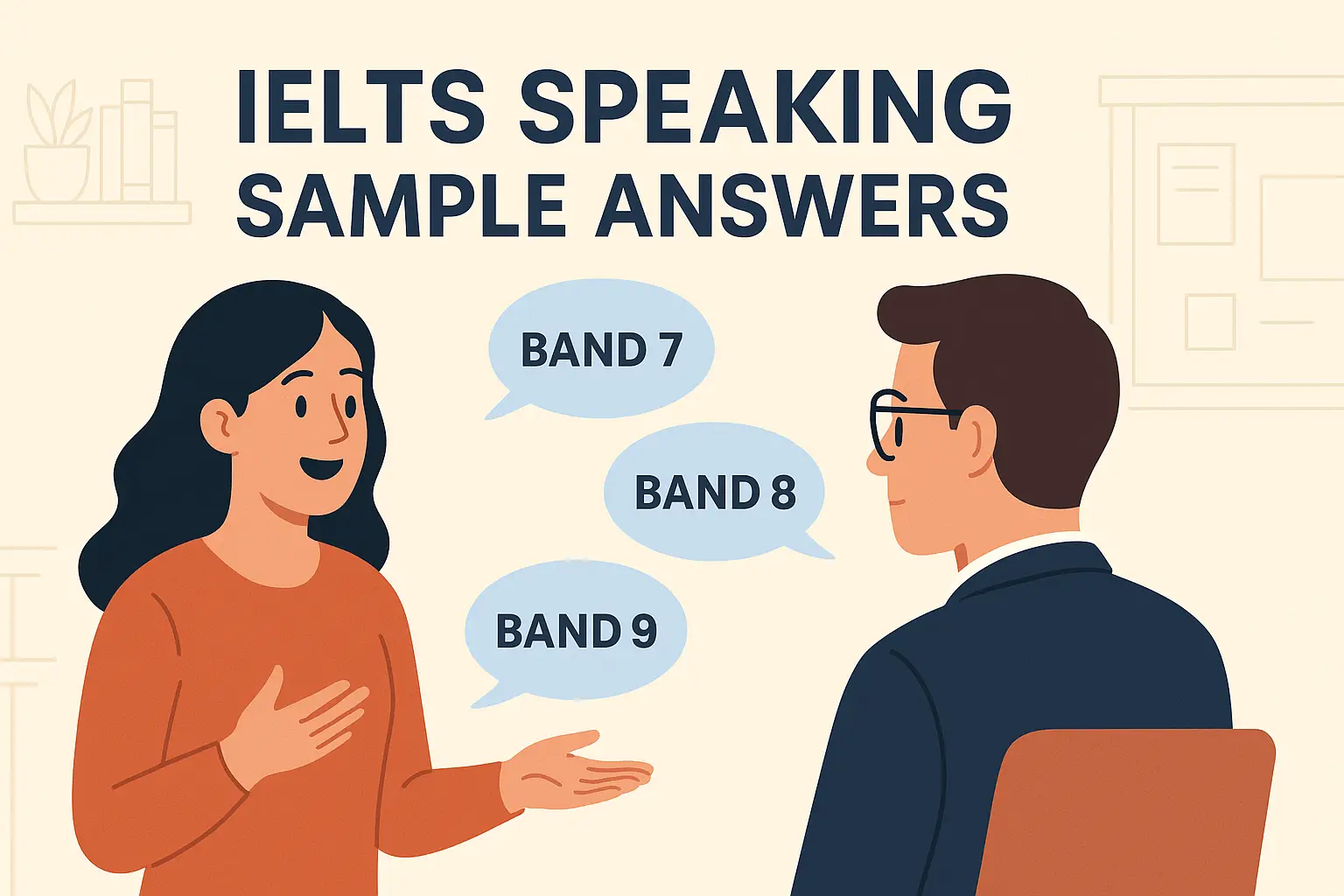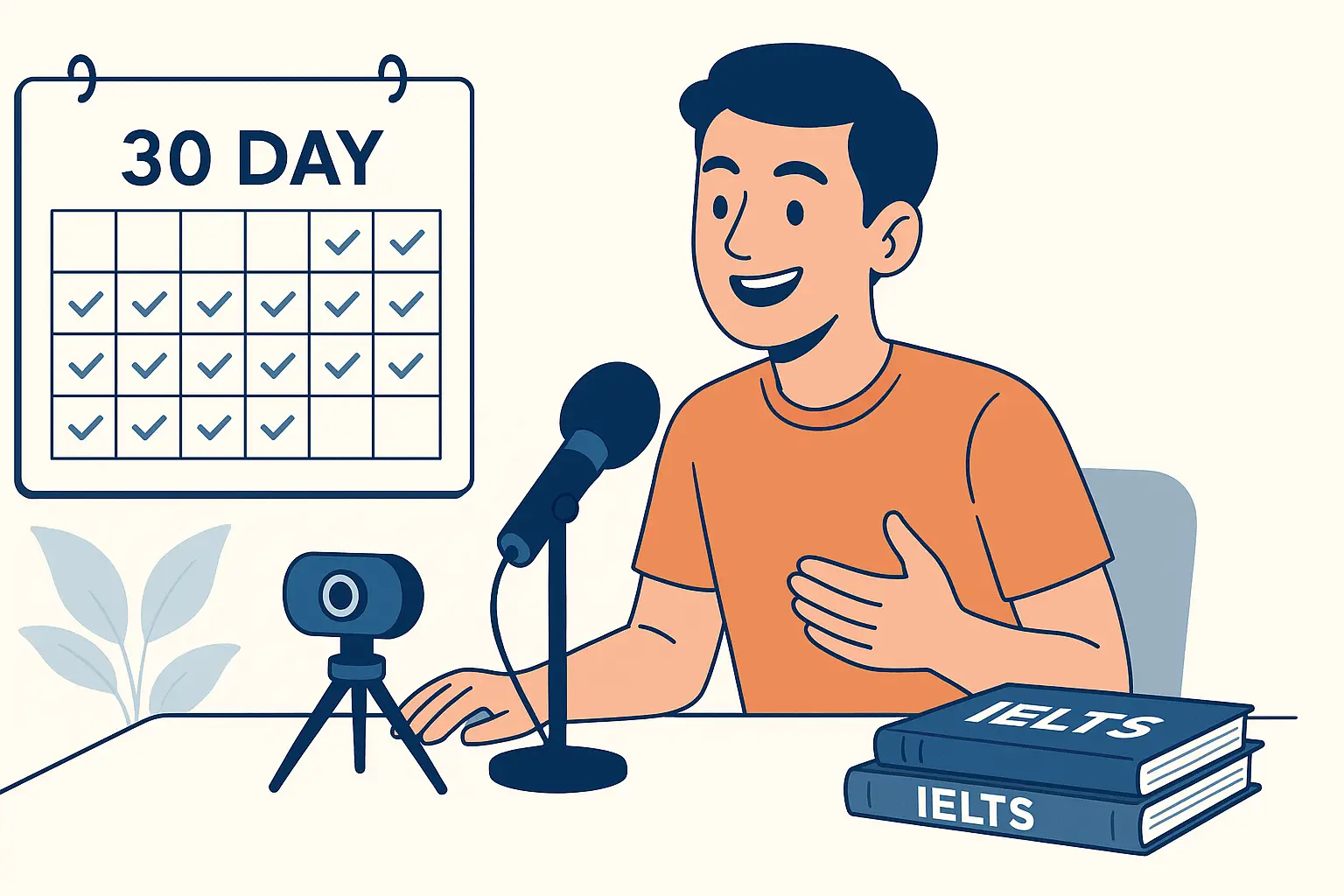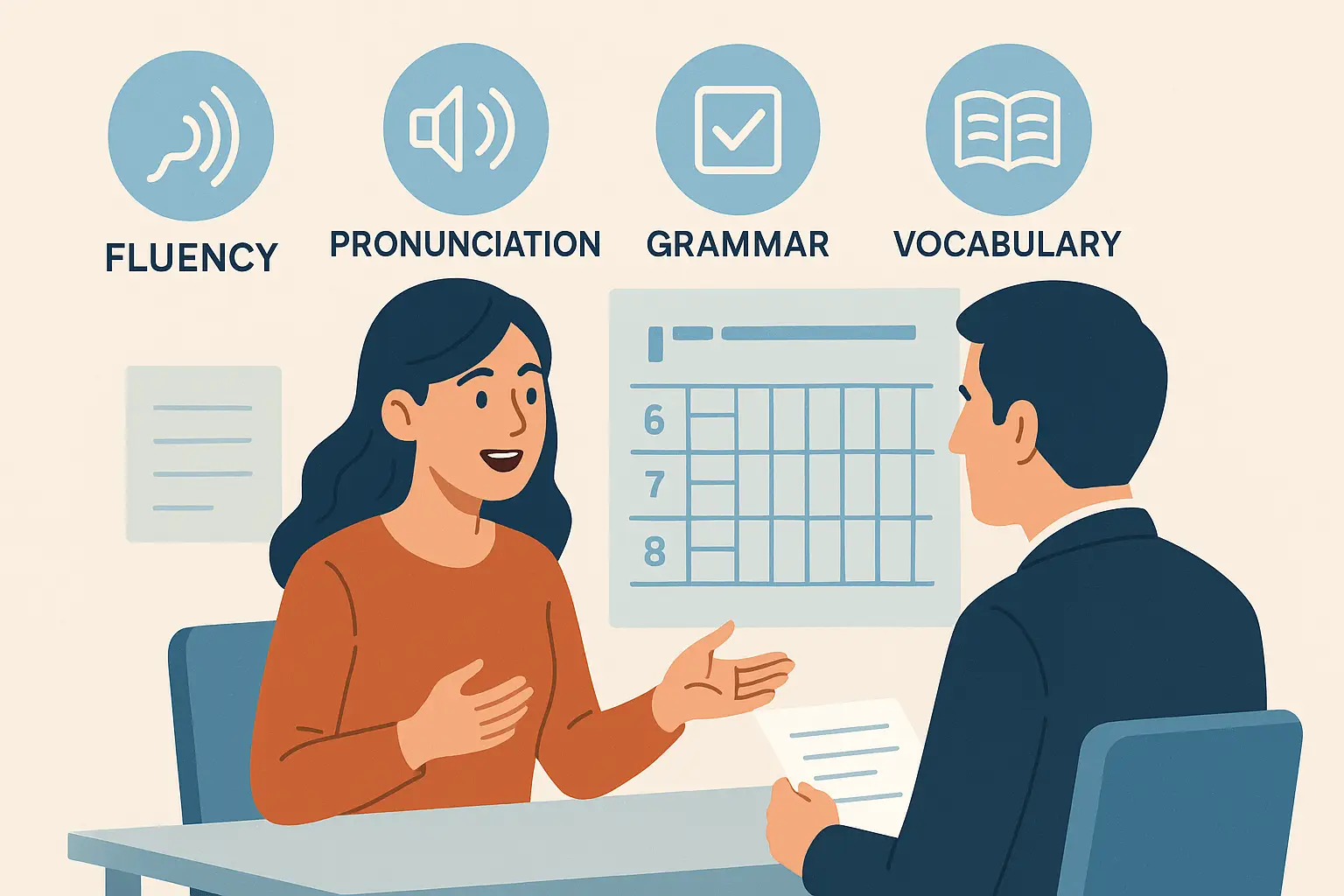- Why Sample Answers Matter More Than Practice Alone
- Band 7 IELTS Speaking Sample Answer: Part 2
- Band 8 IELTS Speaking Sample Answer: Part 3
- Band 9 IELTS Speaking Sample Answer: Part 1
- Real Mistakes Learners Make (And How to Fix Them)
- Where to Find More Authentic Speaking Samples
- Final Thoughts: Speak Like a Human, Not a Script
- FAQs
As an international IELTS teacher working with students from more than 25 countries, one of the most common questions I get is: “What exactly does a Band 7, 8, or 9 answer sound like in the IELTS Speaking test?” In this post, I’m sharing real IELTS Speaking sample answers for Band 7, 8, and 9, based on years of working with learners who’ve sat the test successfully.
Whether you’re preparing for your first IELTS test or trying to push your score from Band 7 to Band 8+, these examples — paired with real student struggles and corrections — will help you deeply understand what examiners look for.
Why Sample Answers Matter More Than Practice Alone
Many students focus only on practicing, but without model answers, they don’t really know if their speaking style matches what the IELTS Speaking Band Descriptors require. I’ve seen learners get stuck at Band 6.5 for months — not because they lacked fluency, but because they misunderstood what a “natural, well-organised” answer actually sounds like.
If that sounds familiar, this post is for you.
For a full overview of how the IELTS Speaking test is structured — including all three parts, band descriptors, and evaluation criteria — read our complete guide here:
👉 IELTS Speaking: Complete Guide
Band 7 IELTS Speaking Sample Answer: Part 2
Topic: Describe a time you were really busy but still managed to finish everything.
Student Answer (Band 7 Level):
“Well, last year during my university finals, I had a lot of assignments and exams at the same time. It was a bit stressful. I planned everything on paper and made a timetable. I didn’t waste time and tried to focus. Some days I studied all night, and even though it was tiring, I managed to submit all my tasks and pass the exams.”
Why it scored Band 7:
This student used a good range of vocabulary (e.g., “tiring,” “submit,” “stressful”), and their fluency was fairly consistent. However, there were some grammatical slips, and sentence structure was quite basic. A few hesitations and self-corrections lowered the fluency score slightly.
My correction tip:
We worked together to upgrade her vocabulary and use more complex structures — things like “despite the workload” and “I delegated my time efficiently.” These tweaks helped her get Band 8 later.
Band 8 IELTS Speaking Sample Answer: Part 3
Topic: Do people today spend too much time working?
Student Answer (Band 8 Level):
“Absolutely. In modern society, work-life balance has become a major concern. People are often under pressure to meet deadlines, especially in competitive fields like tech or finance. As a result, they sacrifice personal time, family interactions, and even their health just to keep up. I think companies should promote flexible working hours to avoid burnout.”
Why it scored Band 8:
This response includes a strong argument, natural use of discourse markers (“absolutely,” “as a result”), complex sentence forms, and topic-specific vocabulary like “burnout” and “work-life balance.” There’s a slight non-native intonation, but it doesn’t interfere with meaning.
Real student issue I fixed:
Initially, this student used generic phrases like “people are busy” or “people work a lot.” With guided practice and examples like these, he developed higher-level language, which boosted his score from 7.0 to 8.0.
Band 9 IELTS Speaking Sample Answer: Part 1
Topic: Do you like your hometown?
Student Answer (Band 9 Level):
“Yes, I absolutely love my hometown. It’s a small coastal town with stunning beaches, and it’s known for its friendly locals and relaxed pace of life. What I especially enjoy is the natural beauty — we’re surrounded by cliffs, forests, and wildlife. Even though I’ve lived in big cities, nothing quite compares to the peaceful vibe I get when I’m home.”
Why it scored Band 9:
This is a fluent, detailed, and fully developed answer. Vocabulary is precise (“coastal town,” “natural beauty,” “peaceful vibe”), grammar is flawless, and the tone is warm and natural. There’s clear intonation and emotional engagement, which examiners love at Band 9.
Real Mistakes Learners Make (And How to Fix Them)
In my years of teaching, I’ve seen learners make three common errors:
- Over-rehearsed answers
Students memorise Band 9 samples but sound robotic. Examiners can tell instantly. - Underdeveloped ideas
Answers stop after 1 or 2 lines. Examiners want expansion, examples, and personal thoughts. - Unnatural transitions
Using phrases like “First of all,” “secondly,” in Part 1 sounds forced. I always recommend casual transitions like “Actually,” or “To be honest,” for better fluency.
We cover these in more detail in our strategy section here:
👉 IELTS Practice, Strategies & Common Mistakes
Where to Find More Authentic Speaking Samples
If you’re aiming for high scores, I highly recommend listening to real candidate recordings on the official IELTS.org and British Council websites. You’ll also find helpful tips from IDP IELTS, which often includes sample videos.
You’ll begin to notice how Band 7 students pause slightly, Band 8 candidates sound more confident and expressive, and Band 9 speakers give answers that feel like a natural conversation.
Final Thoughts: Speak Like a Human, Not a Script
Your goal shouldn’t just be to memorise IELTS Speaking sample answers — it should be to internalise the structure and rhythm of great responses. Speak like you, but smarter, clearer, and more organised.
In our community at IELTS ZONE, I always remind learners: “You’re not being marked on perfection, but on communication.” That mindset alone helps reduce test-day nerves.
FAQs
Q1: Can I memorise IELTS Speaking answers to get Band 9?
No. Examiners are trained to detect memorised answers. It’s better to learn frameworks and upgrade your vocabulary naturally.
Q2: What’s the difference between Band 8 and Band 9 answers?
Band 9 responses are not just accurate — they’re also rich in expression, emotionally engaging, and delivered effortlessly. Band 8 may include minor errors or slightly less fluency.
Q3: How long should my answers be?
In Part 1, 3–4 sentences are fine. In Part 2, aim to speak for 1.5–2 minutes. In Part 3, develop your opinion with examples and clear reasoning.
Q4: Where can I find more band-level comparisons?
Explore our full speaking guide: IELTS Speaking: Complete Guide





